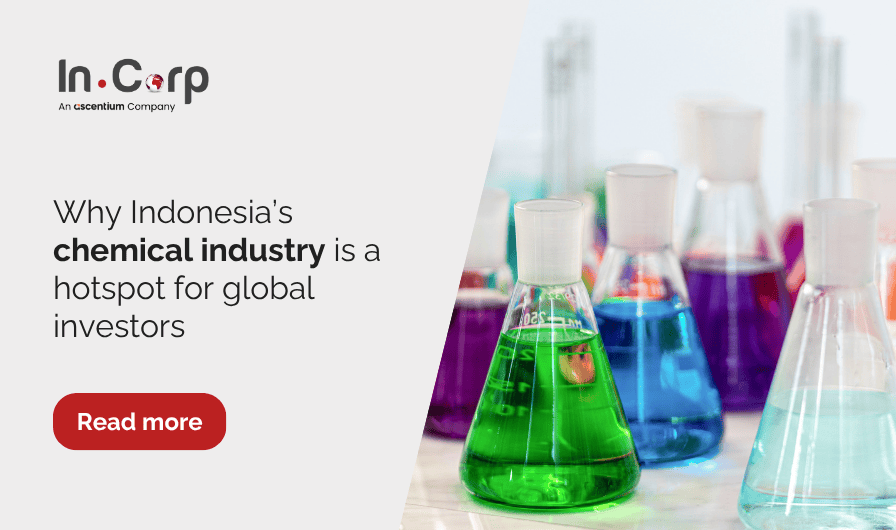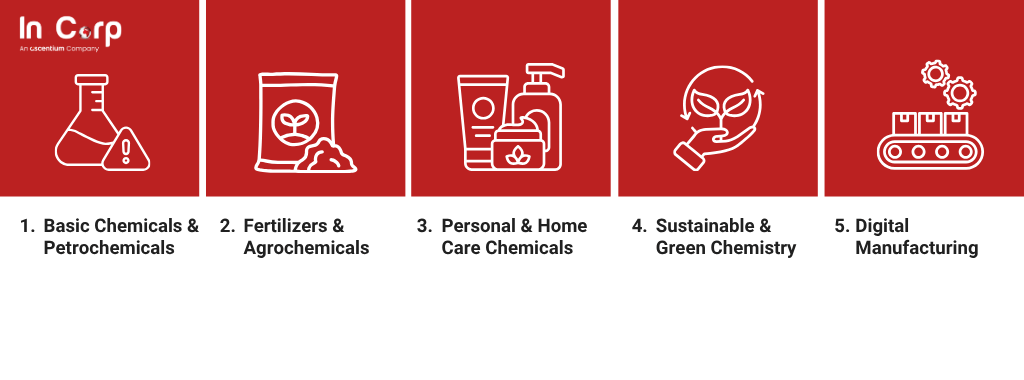The chemical industry in Indonesia is not just a destination; it’s a compelling journey for investors and industrial players. With a robust domestic market, strategic geographic location, and abundant resources, Indonesia’s chemical sector is at a turning point, offering a promising future of growth and prosperity.
Find out what it offers and how a manufacturing business can capitalize on its opportunities.
Industry outlook & growth drivers
Indonesia’s chemical industry is pivotal in the nation’s manufacturing landscape, contributing significantly to GDP and employment. Current data shows that this sector’s revenue is projected to reach US$48.83 billion by the end of 2025, with a steady annual growth of 5.47% (CAGR 2025-2029).
Basic chemicals, fertilizers, and petrochemicals dominate the production landscape, driven by industrial demand and population growth. Several factors also fuel the rapid development of the chemical industry in Indonesia:
- Expanding Manufacturing Base: Growing industrial sectors like automotive, construction, and agriculture fuel higher demand for basic and specialty chemicals.
- Abundant Natural Resources: Access to coal, gas, and palm oil allows local production of key petrochemicals and bio-based oleochemicals.
- Favorable Demographics: A large, youthful population drives demand for chemical-based consumer goods, from packaging to personal care.
- Government Support & Policy Reforms: Policies under Making Indonesia 4.0 encourage investment in chemical manufacturing and downstream industries.
These growth drivers collectively make Indonesia’s chemical sector one of the most promising in Southeast Asia.
Key opportunities for business in Indonesia
Given the abundant opportunities for foreign and local investors, the chemical industry in Indonesia presents diverse business openings across upstream and downstream segments.
Basic Chemicals & Petrochemicals
Indonesia imports over 60% of its basic chemicals, especially methanol, ethylene, and propylene. This dependency reveals a critical market gap. Investors can tap into this domestic demand while reducing reliance on imports.
Fertilizers & Agrochemicals
Agriculture remains a core part of Indonesia’s economy, creating sustained demand for fertilizers, pesticides, and specialty agrochemicals.
Personal & Home Care Chemicals
With Indonesia’s middle class projected to reach 140 million by 2030, demand for consumer goods is rising. This growing consumerism and hygiene awareness momentum causes a fueling demand for surfactants, preservatives, and fragrances used in FMCG products.
Sustainable & Green Chemistry
As global sustainability trends grow, Indonesian firms are pivoting toward eco-conscious production. The country is one of the world’s top palm oil producers, creating vast potential for bio-based chemicals. The government also supports the development of biodegradable polymers, especially in response to single-use plastic bans.
Digital Manufacturing
The shift toward Industry 4.0 has opened new potential in chemical manufacturing. Opportunities exist to implement automation and smart manufacturing technologies that can drastically improve efficiency.
Read more: Unveiling the prospects of the cosmetic industry in Indonesia
How to start a chemical manufacturing in Indonesia
Entering the chemical industry in Indonesia can be highly rewarding, but it requires a deep understanding of hazardous materials handling and local regulations, making compliance critical.
Here’s a step-by-step breakdown to guide your setup process:
1. Register as the Right Business Entity
Most foreign investors register for a PT PMA (Foreign-Owned Limited Liability Company). This structure allows 100% foreign ownership in most chemical subsectors under the latest Positive Investment List.
Once you choose the correct entity, submit your company name, deed establishment, and tax registration via OSS. A trusted agency like InCorp Indonesia can assist with complex legal setup and compliance.
2. Secure Business License (NIB)
Apply for a Business Identification Number (Nomor Induk Berusaha) and a unified operating, importing, and commercial license.
3. Obtain Environmental Permits
Chemical manufacturing requires an Environmental Impact Analysis (AMDAL) or Environmental Management Effort (UKL-UPL). You must assess pollution risks and submit mitigation plans. Environmental permit assistance is highly recommended at this stage.
4. Construction & Facility Setup
Build or lease facilities in designated industrial areas with zoning for chemical activities. Ensure facilities meet safety, waste management, and chemical storage regulations.
5. Compliance with Hazardous Chemical Handling Rules
Ensure proper compliance with chemical classification, labeling, transport, and disposal rules. Below are essential regulations to be aware of:
- Hazardous Waste Management (B3): Ensure safe transport, storage, and disposal of chemical waste under Indonesia’s B3 regulations.
- SNI (Indonesian National Standards): All products and manufacturing practices must comply with SNI standards applicable to the chemical category.
Partnering with a professional consultancy like InCorp can streamline your company’s licensing and compliance processes.
Read more: Why tobacco manufacturers should obtain a B3 waste permit in Indonesia
6. Import Machinery & Raw Materials (if needed)
Register as an Importer (API-U/API-P) and obtain clearance from the Ministry of Trade and Customs if you bring specialized equipment or feedstocks.
The setup process can be complex, but with the proper expert assistance, such as InCorp’s end‑to‑end solution, you can confidently and easily establish your chemical industry in Indonesia.
Ready to enter Indonesia’s chemical industry?
Indonesia’s chemical industry is primed for growth and has opportunities for investors and manufacturers. To ensure success, businesses must focus on market entry strategies and regulatory compliance with the right expert assistance
That’s where InCorp Indonesia (an Ascentium Company) becomes essential. With years of experience, we can help streamline your expansion with our services:
- Company Registration: Set up your business legally and efficiently.
- Business License: Get the necessary permits to operate in the chemical sector.
- Environmental Permit: Ensure compliance with Indonesia’s environmental regulations.
Please complete the form below and ensure a hassle-free setup with our expert guidance today.
Frequently Asked Questions
Why is Indonesia's chemical industry attractive for investors?
Indonesia imports over 60% of its basic chemicals, creating strong opportunities for local production and investment in upstream and downstream sectors.
What are the key business opportunities in the chemical sector?
Promising areas include basic and petrochemicals, fertilizers, personal care chemicals, sustainable green chemistry, and digital manufacturing technologies.
How can foreign investors start a chemical manufacturing business in Indonesia?
Foreign investors can register a PT PMA (Foreign-Owned Limited Liability Company), apply for a Business Identification Number (NIB), and follow environmental and safety regulations.
What environmental permits are required for chemical manufacturing?
Companies must obtain AMDAL or UKL-UPL permits to assess and manage environmental impact, ensuring compliance with Indonesia’s environmental laws.
How can InCorp Indonesia assist in setting up a chemical business?
InCorp provides company registration, business licensing, environmental permit assistance, and compliance support for a smooth and legally compliant market entry.
Get in touch with us.
What you'll get
A prompt response to your inquiry
Knowledge for doing business from local experts
Ongoing support for your business
Disclaimer
The information is provided by PT. Cekindo Business International (“InCorp Indonesia/ we”) for general purpose only and we make no representations or warranties of any kind.
We do not act as an authorized government or non-government provider for official documents and services, which is issued by the Government of the Republic of Indonesia or its appointed officials. We do not promote any official government document or services of the Government of the Republic of Indonesia, including but not limited to, business identifiers, health and welfare assistance programs and benefits, unclaimed tax rebate, electronic travel visa and authorization, passports in this website.




